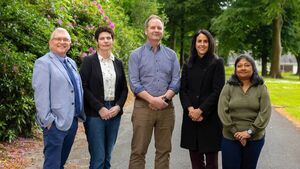SETU's €12.79 million is largest Horizon funding draw down in Ireland

Pictured (L-R): Dr John Wells, SETU, Dr Deirdre Kilbane, Walton Institute SETU, Dr Kevin Doolin, Walton Institute SETU, Prof Marie Claire, SETU, Dr Indrakshi Dey, Walton Institute SETU
South East Technological University (SETU) has emerged as the leading technological university in Ireland for securing Horizon Europe research funding, drawing down a total of €12.79 million to date.
A spokesperson for the university told Waterford News & Star and waterford-news.ie that it positions SETU at the forefront of European-funded research and innovation among Ireland’s technological universities.
Horizon Europe is the EU’s key funding programme for research and innovation, tackling climate change, helping to achieve the UN’s Sustainable Development Goals and boosting the EU’s competitiveness and growth.
The spokesperson said SETU’s strong performance underlines the University’s growing international profile, research excellence and ability to deliver high-impact outcomes in partnership with European collaborators.
The €12.79 million drawdown is the result of strategic leadership and expertise across a range of disciplines.
She said the university's strong Horizon Europe performance is underpinned by contributions from researchers across the university.
Among those leading large-scale, EU-funded projects as coordinators are; Dr Deirdre Kilbane, Director of Research, Walton Institute; Dr Indrakshi Dey, Head of the Programmable Autonomous Systems (PAS) Division, Walton Institute; Professor John Wells, Head (Waterford) Faculty of Health Sciences; James Clarke, Strategic EU Liaison Manager, Walton Institute, and Gary McManus, Research Project Manager, Walton Institute.
"Their leadership in coordinating Horizon Europe projects reflects the University’s capability to manage complex international consortia and drive innovation on a global scale," said the spokesperson.
"In addition to these lead coordinators, many other SETU researchers play vital roles as partners in Horizon Europe projects across a diverse range of thematic areas," she added. Those areas include sustainability and health to advanced manufacturing and digital technologies.
Speaking about the achievement, Prof Veronica Campbell, President of SETU, said: “This remarkable success is a testament to the calibre of our researchers, the strength of our research environment and SETU’s ambition to be a leader in impactful, international collaboration."
"Horizon Europe funding is highly competitive and this level of success reflects our capacity to lead major initiatives that deliver real societal and economic value," she added.
Prof Marie Claire Van Hout, Vice President for Research, Innovation and Impact at SETU, added: “Horizon Europe is about addressing the world’s most pressing challenges - climate action, digital transformation, health equity and more."
"Our researchers are not just contributing to these solutions, they are leading them," she said.
"This funding supports SETU’s mission to deliver excellent, engaged and inclusive research that serves our region and beyond.”
Much of SETU’s Horizon Europe success is led by Walton Institute, a principal contributor to research and innovation within the University, focused on information and communication technologies.
Projects led by Walton Institute span areas such as artificial intelligence, future networks, and strategic digital transformation - highlighting SETU’s strength in future-focused ICT.
Dr Kevin Doolin, Executive Director of the Walton Institute commented: "These most recent results reflect Walton Institute's consistent drive for excellence across multiple EU funding streams and is a testament to the continued strong performance of Walton staff.”
In addition to scientific leadership, SETU’s project management capacity and international partnerships have played a key role in this success and SETU continues to build strong consortia across Europe, engaging with SMEs, public bodies and community stakeholders to translate research into meaningful outcomes.
Meanwhile, the university's spokesperson said that as SETU continues to expand its research activity across its campuses, Horizon Europe remains a key strategic priority for securing further funding, deepening international partnerships, and addressing major societal and industry challenges.






